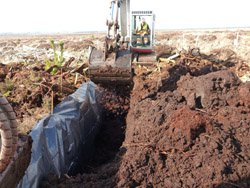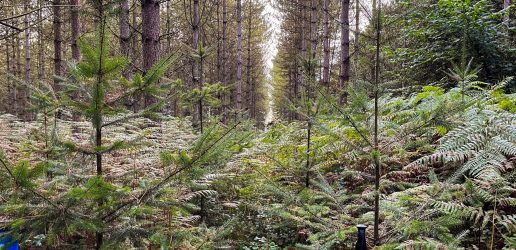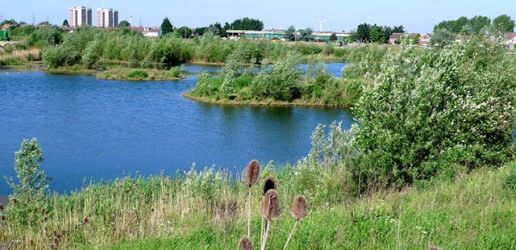
Restoration of peatland is increasingly seen as a valuable and cost-effective way to help limit climate change, but some afforested peatlands have seemed impossible to restore due to underground cracks that drain away water. Now, recent trials of new techniques for rewetting cracked peat have shown promising results.
Peatlands provide globally important benefits, such as helping to regulate our climate and water, and providing valuable wildlife habitats. However, forestry operations and other land use can sometimes result in a degradation of their soil and an overall release of carbon. National plans in Scotland and Wales now propose peatland restoration on an unprecedented scale, while in England considerable peatland research is underway alongside restoration work.
Forest Research’s recent trials have shown that new trenching techniques can form a barrier that prevents water drainage through underground cracks, allowing successful rewetting of afforested sites previously regarded as unrestorable.
Project leader, Russell Anderson, explains: “We created barriers to prevent water draining away by digging trenches deeper than the underground cracks and repacking them with peat. In some cases, we also added a plastic membrane lining one side of the trench. We carried out our trials at two different sites – a lowland raised bog and a blanket bog. In both sites, we saw a dramatic rise in the underground water level after applying the treatments, both with and without the membrane.”
Restoring peatland brings many benefits, including:
- reducing carbon emissions;
- reducing river peak flows to limit flooding;
- improving water quality in streams, which is good for aquatic life;
- providing more habitats for peatland’s unique wildlife.
What’s of interest
Forests and Peatland Habitats in Scotland
International Peatland Society
Scotland’s National Peatland Plan
Scottish Government Draft Climate Change Plan
Natural Resources Wales: Peatlands in Wales
Related pages
Recent News
View All news
Underplanting extends range of coniferous tree species to diversify future commercial timber production
New Forest Research published in Forest Ecology and Management shows that underplanting could widen the range of conifers suitable for future UK timber production.

New land regeneration resources for creating green spaces on previously used land now available
The new resources bring together the latest learnings on land regeneration and climate change, and optimal soil thickness for planting on previously used land.

New national survey launched to strengthen plant pest and disease detection across UK horticulture
UK horticulture and landscaping businesses invited to take part in survey to strengthen non-native plant pest and disease detection and reporting.

Underplanting extends range of coniferous tree species to diversify future commercial timber production
New Forest Research published in Forest Ecology and Management shows that underplanting could widen the range of conifers suitable for future UK timber production.

New land regeneration resources for creating green spaces on previously used land now available
The new resources bring together the latest learnings on land regeneration and climate change, and optimal soil thickness for planting on previously used land.

New national survey launched to strengthen plant pest and disease detection across UK horticulture
UK horticulture and landscaping businesses invited to take part in survey to strengthen non-native plant pest and disease detection and reporting.
